March 2012/2
Download Roundup
Brian
Wilson
Previous Roundups
March 2012/1 - here
Earlier versions are indexed here.
Download
of the Month
Gustav MAHLER (1860-1911)
Symphony No. 8 in E flat major Symphony of a Thousand (1906)
Heather Harper – soprano I (Magna Peccatrix)
Lucia Popp – soprano II (Una Poenitentium)
Arleen Auger – soprano III (Mater Gloriosa)
Yvonne Minton – contralto I (Mulier Samaritana)
Helen Watts – contralto II (Maria Aegyptiaca)
René Kollo – tenor (Doctor Marianus)
John Shirley-Quirk – baritone (Pater Ecstaticus)
Martti Talvela – bass (Pater Profundus)
Wiener Staatsopernchor Wiener Sängerknaben/Wiener Staatsopernchor/Wiener
Singverein
Chicago Symphony Orchestra/Sir Georg Solti
rec. August-September 1971, Sofiensaal, Vienna
UNI005 [79:48] – from linnrecords.com
(mp3, 16- and 24-bit lossless)
 Having
reviewed this download in my previous Roundup, I’d normally
be listing this under the Second Thoughts heading, but I’m
delighted to endorse Dan Morgan’s suggestion that we make
it Download of the Month, especially as I’ve
been more and more impressed as I’ve listened to it again
since writing about it.
Having
reviewed this download in my previous Roundup, I’d normally
be listing this under the Second Thoughts heading, but I’m
delighted to endorse Dan Morgan’s suggestion that we make
it Download of the Month, especially as I’ve
been more and more impressed as I’ve listened to it again
since writing about it.
Those inter-track glitches that he mentions occur only when
downloading the tracks separately – always use Linn’s
own Download Manager – but see my review of Britten’s
Peter Grimes below for more on the subject, especially
my preference for playing 24/96 downloads with Songbird.
Dan writes: This really is a nostalgia trip, as these
LPs set me off on my Mahler quest nearly forty years ago. It
was a happy accident when I came across this Decca set –
with its distinctive fish-eye photo on the box – in my
record library. After a single, stunned audition I went out
and bought the records, which became the cornerstone of my Mahler
collection. A couple of years ago I acquired the 24/96 Legends
reissue, but found it oddly alienating. And despite the extra
clarity and focus there’s no disguising moments of compression
and overload – at the culmination of Part I for instance
– all of which seems more disfiguring on the Legends CD
than it was on the LPs.
Impatient to compare that disc with the 24/96 flacs from Linn,
I downloaded the very large files with a minimum of fuss using
their download manager. I’d discourage you from downloading
the tracks individually, as I suspect that causes the drop-outs
and awkward joins that Brian Wilson mentioned here.
First off I was pleased to see all 16 cues are retained, so
useful in a work of this length. I fired up the PC, and within
seconds of hearing that glorious invocation all those memories
came flooding back. Solti’s muscular, sometimes headlong,
approach to Mahler has been much maligned by the musical revisionists,
and while haste is a factor in many of his recordings it bothers
me less when the performance has such authority and thrust.
Yes, there are incoherent patches in Part I, but when
the effect is so exhilarating it’s easy to overlook Solti’s
impetuousness. As for the roster of soloists, it reads like
a Who’s Who of great voices from the 1970s; more
importantly, they are a very well balanced and impassioned team.
But it’s in the crags and valleys of Part II – with
all its antiphonal effects – that this performance really
blossoms. The sound is warm and spacious – qualities sorely
lacking in the Legends reissue – and although the soloists
are quite close it all adds to the immediacy and immersive nature
of this performance.
It goes without saying that the orchestra has never sounded
so full and well-rounded, voices well caught and upper strings
clear without being strident. As for the bass, it’s firm,
if not as extended as it is on some modern recordings, and that
means the organ isn’t always as physically ‘present’
as I’d remembered from the LPs. That said, in Wie Felsenabgrund
mir zu Füßen (tr. 9) it is tummy-wobbling, the
Wunderhorn sunniness of the Vienna Boys as much a delight
now as it was then.
Goodness, I’d forgotten just how complete Solti’s
understanding of this work is, tempo relationships, rhythms
and changing textures superbly judged. With all of that comes
an unerring sense of the dramatic – he was as much a man
of the theatre as he was of the concert hall – none of
the symphony’s nodal points missed or underplayed. In an
age of numbing ubiquity, where Mahler is a booming industry,
it’s easy to forget just how important – and earth-moving
– these early recordings were, and I include Kubelík,
Bernstein and Abravanel among them. Indeed, I found myself quite
choked up by the forgotten felicities of this great set. It
really is a deserving classic and, at last, we have a high-res
re-master that captures all the awe and sense of discovery that
attended those pioneering LPs.
For a perfect example of this download’s analogue-like
‘bloom’ – one of veteran critic Edward Greenfield’s
famous descriptors – just listen to the full, ripe harp
sound in Höchste Herrscherin der Welt (tr. 12).
Such luminosity and detail is all very well, but so many Mahler
Eights founder through want of cohesion and thrust. There’s
no danger of that here, as Solti knows exactly where
he’s going from the moment he sets sail. Indeed, there’s
a palpable, deep-ocean swell as the ship nears port, the crow’s
nest cry of ‘Blicket auf’ a sign that land is near
– those glorious harps again.
Few recordings of Mahler’s Eighth have ever come close
to the surge and amplitude of this one, as much a testament
to the skills of Kenneth Wilkinson and Gordon Parry as it is
to those of Solti and his formidable forces. Indeed, I’d
forgotten just how much tension Solti generates in the closing
moments, or how sustained the beauty of the composer’s
many colouristic touches. I defy anyone not to be moved –
and moved mightily – by this approaching apotheosis, the
massed choirs so full of certainty and splendour. And yes, the
organ makes a powerful impact here, the radiance of that great
finale scarcely dimmed by that familiar compression and overload.
This download knocks the Legends CD into a cocked hat; true,
there are moments in both where the recording shows its age,
but in its latest incarnation there’s a vastly improved
focus and fullness that will surely appeal to vinyl junkies.
If, like me, your collection includes Mahler Eights on CD, Blu-ray
and downloads, you may hesitate before paying £18 for
another one. Don’t, for this is one of the very best downloads
I’ve heard, and one that confirms just how sophisticated
– and musically satisfying – this technology has become.
Go on, treat yourself.
Dan Morgan
http://twitter.com/mahlerei
Discovery
of the Month
Ivan MOODY (b.1964) Passion
and Resurrection (1993)
Red Byrd
Capella Amsterdam/Daniel Reuss – rec. 1996. DDD
Pdf booklet with texts included.
HYPERION CDA66999 [78:11] – from hyperion-records.co.uk
(mp3 and lossless)
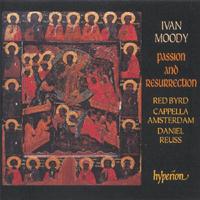 I
had encountered Ivan Moody only as the writer of sleeve-notes
before lighting upon this recording. Not surprisingly for an
English composer who has found his spiritual home in the Eastern
Orthodox Church, parallels with John Tavener spring to mind
– certainly his music has the same combination of approachability
and profundity. If the combination of the Passion and the Resurrection
in one work seems unusual to Westerners*, the notes explain
how the two are inextricably interwoven in the Orthodox services
for Holy Week, as in the refrain ‘We worship Thy Passion,
O Christ: show us also Thy glorious Resurrection!’
I
had encountered Ivan Moody only as the writer of sleeve-notes
before lighting upon this recording. Not surprisingly for an
English composer who has found his spiritual home in the Eastern
Orthodox Church, parallels with John Tavener spring to mind
– certainly his music has the same combination of approachability
and profundity. If the combination of the Passion and the Resurrection
in one work seems unusual to Westerners*, the notes explain
how the two are inextricably interwoven in the Orthodox services
for Holy Week, as in the refrain ‘We worship Thy Passion,
O Christ: show us also Thy glorious Resurrection!’
The texts, contained in the accompanying booklet, are mainly
in English, though with passages in (transliterated) Church
Slavonic and Greek. The chant sections sound midway between
Roman Catholic and Anglican practice on the one hand and Russian
Orthodox on the other. The performance is hauntingly beautiful
and the recording does it full justice.
* but not to John Donne who wrote “so death doth touch the Resurrection.”
Bargain
of the Month
Arnold BAX (1883-1953) Tintagel
[13:38]
George BUTTERWORTH (1885-1916)
The Banks of Green Willow [5:28]
Gustav HOLST (1874-1934)
The Perfect Fool – ballet [10:54]
George BUTTERWORTH A
Shropshire Lad [8:48]
London Philharmonic Orchestra/Sir Adrian Boult – rec.1954.
ADD/mono
Ralph VAUGHAN WILLIAMS (1872-1958)
On Wenlock Edge [20:56]
George Maran (tenor); London String Quartet; Ivor Newton (piano)
– rec. 1955. ADD/mono
NAXOS CLASSICAL ARCHIVE 9.80222 [59:44] – from classicsonline.com
(mp3) or stream from Naxos Music Library (not available
in the USA and some other countries)
 When
the Bax, Butterworth and Holst items appeared in 1955 on a very
short LP, they cost 36/5 – over £45 in today’s
values. Now, unless you live in a country where copyright lasts
more than fifty years, they can be yours with the addition of
On Wenlock Edge for just £1.99. the latter came
on a 10" LP for just under £1 – another £25+
in today’s money. Trevor Harvey described the Holst as
scintillating and so it remains, as do the other items, in a
recording which sounds stupendous for its age; though mono only,
there’s a good spread of sound.
When
the Bax, Butterworth and Holst items appeared in 1955 on a very
short LP, they cost 36/5 – over £45 in today’s
values. Now, unless you live in a country where copyright lasts
more than fifty years, they can be yours with the addition of
On Wenlock Edge for just £1.99. the latter came
on a 10" LP for just under £1 – another £25+
in today’s money. Trevor Harvey described the Holst as
scintillating and so it remains, as do the other items, in a
recording which sounds stupendous for its age; though mono only,
there’s a good spread of sound.
The performance of Wenlock Edge – warmly received
at the time – is well worth hearing, but it’s been
superseded by more recent versions. George Maran’s old-school
diction now sounds stilted and the sound is noticeably drier,
though more than acceptable. For the sake of the orchestral
items, this is one of the highlights of a series which is well
worth exploring if you can.
Second Thoughts
Igor STRAVINSKY (1882-1971)
Pétrouchka (original 1911 version) [34:33]
Le Sacre du Printemps (Rite of Spring) (1913 rev. 1947)
[33:32]
Bergen Philharmonic Orchestra/Andrew Litton – rec. August
2008 (Rite) and June 2009 (Pétrouchka)
Pdf booklet included
BIS-SACD-1474 [69:00] – from eclassical.com
(mp3, 16- and 24-bit lossless)
 Having
recently reviewed the much-heralded Channel SACD of Iván
Fischer’s Rite of Spring I was curious to hear how
it compared with Litton’s Bergen account. But as Brian
Wilson has already reviewed the downloads of both in some detail
– see here
– I’ll confine myself to a few general comments about
the Litton. First of all, it’s a 24-bit/44.1kHz recording,
a fact that’s bound to be seized upon by the inveterate
number crunchers who believe ultimate sound quality can be measured
using an oscilloscope. Oddly enough, many can’t actually
tell the difference between 24/44.1 and 24/96 until after
the unpalatable facts are revealed.
Having
recently reviewed the much-heralded Channel SACD of Iván
Fischer’s Rite of Spring I was curious to hear how
it compared with Litton’s Bergen account. But as Brian
Wilson has already reviewed the downloads of both in some detail
– see here
– I’ll confine myself to a few general comments about
the Litton. First of all, it’s a 24-bit/44.1kHz recording,
a fact that’s bound to be seized upon by the inveterate
number crunchers who believe ultimate sound quality can be measured
using an oscilloscope. Oddly enough, many can’t actually
tell the difference between 24/44.1 and 24/96 until after
the unpalatable facts are revealed.
Anyway, that’s a diversion. How do Litton’s readings
of these two great ballets stack up? As far as the Rite
is concerned, not very well. Brian is right about Fischer being
very slow by comparison, but still his version strikes me as
the more overtly dramatic one. Also, the Bergen band –
who play very well indeed – aren’t quite in the same
league as the Hungarians, who bring formidable weaponry to bear
in those huge tuttis. And while assessing the sound quality
of a download and an SACD is akin to comparing apples and oranges,
there’s no denying the somewhat ‘hi-fi’ quality
of Litton’s big bass drum. Also, one has to crank up the
BIS recording quite a bit before it really comes alive.
So, which of these Rites would I choose? Neither, is
the short answer. Fischer has the extra sophistication and weight,
whereas the outwardly more urgent Litton is much too reticent
for my tastes; put another way, it’s just not the earth-cracking
narrative it should be. And in terms of sound, I suspect the
gap between the Fischer and Litton recordings is a lot closer
than the word lengths and sampling rate would suggest –
cue a rush to the oscilloscopes.
But that’s not the whole story, for Litton offers a fresh
and invigorating performance of Pétrouchka that’s
rather splendid. Those fairground rhythms are most beautifully
sprung, the playing is crisp and animated, and I sense a far
stronger narrative here than I do in the accompanying Rite.
The recording – made nearly a year later – is very
detailed and atmospheric.
This wasn’t meant to be a shoot-out between Litton and
Fischer, but as we’re already at the corral I’d suggest
this dramatically coherent and colourful Pétrouchka
is a far more compelling companion to the Rite than Fischer’s
micro-managed Firebird suite.
So, neither would be my first choice for the Rite, but
then the flexibility of downloads means one can cherry-pick
the best bits from a given recording. That’s exactly what
I’d do here.
Dan Morgan
http://twitter.com/mahlerei
***
Tomás Luis
de VICTORIA (1548-1611)
Officium Hebdomadæ Sanctæ: Tenebræ
Responsories
The Sixteen/Harry Christophers
VIRGIN CLASSICS 5099902942957 [69:56] – from classicsonline.com
(mp3) or stream from Naxos Music Library
 Until
the liturgical reforms of the 20th century it had been the practice
to celebrate Matins of Maundy Thursday, Good Friday and Holy
Saturday during the previous evening, with the candles on a
special hearse being extinguished one by one until darkness
prevailed apart from one candle which represented the light
of Christ. The readings for these days came from the Lamentations
of Jeremiah, frequently set by renaissance and baroque composers,
and the responsories linked the Old Testament readings to the
events of the New Testament. Of the many settings of these responsories
Victoria’s is outstanding and it has been well served by
recordings from the Westminster Cathedral Choir and George Malcolm
onwards. Last seen on Double Decca 433 9142.
Until
the liturgical reforms of the 20th century it had been the practice
to celebrate Matins of Maundy Thursday, Good Friday and Holy
Saturday during the previous evening, with the candles on a
special hearse being extinguished one by one until darkness
prevailed apart from one candle which represented the light
of Christ. The readings for these days came from the Lamentations
of Jeremiah, frequently set by renaissance and baroque composers,
and the responsories linked the Old Testament readings to the
events of the New Testament. Of the many settings of these responsories
Victoria’s is outstanding and it has been well served by
recordings from the Westminster Cathedral Choir and George Malcolm
onwards. Last seen on Double Decca 433 9142.
This recent reissue from The Sixteen offers a good alternative
to the Hyperion (CDA66304 – see March 2010 Roundup)
or the Tallis Scholars (The Victoria Collection, Gimell GIMBX304,
3 budget CDs – see March 2011/2 Roundup)
and does so for just £5.99. You may prefer the slightly
faster pace of The Sixteen. There’s only an mp3 version,
good as that is, whereas the Hyperion comes in mp3 and lossless
sound, and there’s no booklet of texts, but that’s
available to all comers from the Hyperion web site – here.
1600: Masterpieces of 17th-century Italian Instrumental Music
Anon. (Luigi ROSSI? c.1597-1653)
Fantaisie (les pleurs d’Orphée) [3:12]
Giovanni GABRIELI (c.1554-1612)
Canzone a quattro detta la spiritata (1608) [3:05]
Tarquinio MERULA (c.1594-1665)
Capriccio cromatico a 4 [3:02]
Giovanni da MACQUE (c.1550-1614)
Consonanze stravaganti [1:37]
Girolamo FRESCOBALDI (1583-1643)
Canzona quinta a quattro (1614) [3:32]
Tarquinio MERULA Capriccio
cromatico [3:02]
Giovanni SALVATORE (c.1620?-c.1668)
Canzone francese seconda a Quattro (1641) [3:10]
Dario CASTELLO (c.1590-c.1658)
Sonata decima sesta à 4 per stromenti d’arco
(1644) [5:56]
Gaspare ZANETTI (fl.1626-1645)
Il scolaro… per imparare a suonare di violino (1645)
[9:45]
Biagio MARINI (1594-1663)
Passacaglio a quattro e a tre (1655) [4:04]
Giovanni LEGRENZI (1626-1690)
Sonata seconda a quattro (1662) [6:12]
Giovanni BONONCINI (1670-1747)
Sinfonia quarta (1687) [6:26]
Giuseppe TORELLI (1658-1709)
Concerto for strings, Op.6/1 [5:51]
Evaristo dell’ABACO (1675-1742)
Concerto a quattro da chiesa, Op. 2/1 in d minor
(1712) [7:49]
Mauro Lopes Ferreira, Nicholas Robinson (violins), Ettore Belli
(viola), Luca Peverini (cello), Ugo di Giovanni (theorbo)
Concerto Italiano/ Rinaldo Alessandrini (harpsichord, organ)
rec. Pontifico Istituto di Musica Sacra, Rome, March 2011. DDD.
NAÏVE OP30531 [66:44] – download from hmvdigital.com
(mp3)
[A more detailed version of this review is due to appear among
the main Musicweb International reviews.]
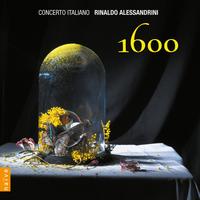 The
1600 of the title should really be c.1660 –
it’s merely a peg on which to hang a programme designed
to demonstrate the advances and developments in instrumental
music during the seventeenth century as it moved away from a
mere accompanying role and developed in its own right. Even
a glance at the dates of the composers will reveal that half
of them were not even born in 1600, let alone composing.
The
1600 of the title should really be c.1660 –
it’s merely a peg on which to hang a programme designed
to demonstrate the advances and developments in instrumental
music during the seventeenth century as it moved away from a
mere accompanying role and developed in its own right. Even
a glance at the dates of the composers will reveal that half
of them were not even born in 1600, let alone composing.
The crucial dates are actually a little earlier than 1600: the
publication in 1587 of Antonio Gabrieli’s Ricercar per
suonar and his nephew Giovanni’s Sonata pian’
e forte (1597). Nothing here is quite that early –
the earliest date given is 1608: the Fantaisie attributed to
Rossi the first item was, presumably, placed first because in
it the violin takes on the role of the human voice, that of
Orpheus lamenting the loss of Euridice.
If all this sounds like a mere intellectual exercise, let me
say at once that it’s much more than that. I can think
of many other more vital recordings by Concerto Italiano and
Rinaldo Alessandrini – the list in the booklet serves to
remind us how many first-rate recordings they have made for
Naïve/Opus111 – but I very much enjoyed hearing this
new release.
Of the many other first-rate recordings which Concerto Italiano
have made, my own personal favourites are to be found in their
5-CD set of Monteverdi Madrigals (OP30348, also available
separately), Scarlatti and Pergolesi Stabat Mater (OP30160)
and Vivaldi Gloria (OP30195), with a warning that
the last two are taken at a very fast pace. If 1600 is
not quite in that essential category, it’s still very enjoyable.
The hmvdigital.com download, at £7.99, represents a useful
saving over the cost of the CD; that from emusic.com at £13.44
is more expensive than the CD (available for around £12.00
in the UK). Amazon.co.uk also have it at £7.99 but currently
only the hmvdigital.com version is at the full 320kb/s rate.
Holy Week at the Chapel of the Braganza Dukes
Music for Palm Sunday
Manuel MENDES (c.1547-1605)
Asperges me [5:09]
Chant Hosanna filio David [0:36]
Gabriel Díaz BESSÓN
(before 1590-1638) Sanctus and Benedictus
[2:23]
Chant Pueri hebræorum portantes [0:37]
Tomás Luis de VICTORIA
(1548-1611) Pueri hebræorum vestimenta [2:30]
Chant Ante sex dies [2:16]
Anon / Francisco António de
ALMEIDA (fl. 18th century) Gloria, laus, et honor
[8:10]
Motets for Holy Week
Alonso LOBO (1555-1617) Tristis
est anima mea [3:31]
Juan Esquivel de BARAHONA (c.1563-after
1613) O vos omnes [2:35]
Giovanni GIORGI (d.1762) Clarifica me Pater [5:14]
Music for Maundy Thursday
Fernando de ALMEIDA (d.1660)
Incipit Lamentatio Jeremiæ Prophetæ [13:17]
In monte Oliveti [3:05]
Giovanni Pierluigi da PALESTRINA (1525/6-1594)
Fratres ego enim accepi [3:16]
João Lourenço REBELO
(1610-1661) Panis angelicus [3:30]
Music for Good Friday
Fernando de ALMEIDA Miserere
mei Deus (Psalm 50/51) [10:28]
Ginés de MORATA (fl.
16th century) Cum descendentibus [1:16]
Juan de Castro y MALAGARAY (c.
1572-1632) Caligaverunt oculi mei [4:31]
A Capella Portuguesa/Bernadette Nelson, Owen Rees (directors)
with Frances Kelly (harp) and Stephen Farr (organ) – rec.1996.
DDD
pdf booklet with texts and translations included.
HYPERION CDA66867 [72:24] – from hyperion-records.co.uk
(mp3 and lossless)
 This
recording presents a sample of the music which would have been
performed in the chapel of the Dukes of Braganza at Villa Viçosa
in Portugal around 1736, taken from a collection dated to that
year. Some of the composers are fairly well known; many are
not, but everything is well worth hearing. The performances
from this group of specialists in Portuguese music of the period
are first-class, though the harp and organ somehow get lost
in the mix.
This
recording presents a sample of the music which would have been
performed in the chapel of the Dukes of Braganza at Villa Viçosa
in Portugal around 1736, taken from a collection dated to that
year. Some of the composers are fairly well known; many are
not, but everything is well worth hearing. The performances
from this group of specialists in Portuguese music of the period
are first-class, though the harp and organ somehow get lost
in the mix.
The CD is available only from Hyperion’s archive service,
so the availability of the download is very welcome. The recording
is excellent and the booklet well up to Hyperion’s usual
standard, though without the insert for the rear of the CD case.
One small niggle – Asperges me (track 1) is rendered
as ‘You will anoint me’. Luckily that’s a mistranslation,
as those who regularly got showered at High Mass will testify
– no oil involved, fortunately, only water. ‘Thou
shalt purge me with hyssop and I shall be clean’.
Reinhard KEISER (1674-1739)
St Mark Passion (Jesus Christus ist umb unsrer Missethat
willen verwundt, c.1717)
Bernhard Hirtreiter (Tenor I – Evangelist)
Hartmut Elbert (Bass – Jesus / Bass arias)
Jochen Elbert (Tenor II – Petrus / Pilatus / Tenor arias)
Tanja d’Althann (Soprano I – Soprano arias)
Petra Geitner (Soprano II – Magd / Soprano aria Nr.30)
Melinda Paulsen (Alt – Judas / Hohepriester / Hauptmann
/ Kriegsknecht / Arias)
Parthenia Vocal
Parthenia Baroque/Christian Brembeck – rec. c.1993. DDD
Pdf booklet with texts and translations included.
CHRISTOPHORUS CHR77323 [62:50] – from classicsonline.com
(mp3) or stream from Naxos Music Library
 Reinhard
Keiser, born a few years before Telemann and Handel, once considered
the equal of both, now has to rest content with a few lines
in reference works where their entries run to pages. He normally
has to share CD programmes with other composers, but his two
most famous operas have been recorded – Krösus
(Crœsus) on Harmonia Mundi HMC90 1714/16,
3 CDs, and Nuova Era NE693435, 2 CDs; Masaniello Furioso
on CPO 999 1102, 2 CDs. I reviewed a good workaday
recording of Fredegunda on Naxos 8.660231/32 –
here.
Reinhard
Keiser, born a few years before Telemann and Handel, once considered
the equal of both, now has to rest content with a few lines
in reference works where their entries run to pages. He normally
has to share CD programmes with other composers, but his two
most famous operas have been recorded – Krösus
(Crœsus) on Harmonia Mundi HMC90 1714/16,
3 CDs, and Nuova Era NE693435, 2 CDs; Masaniello Furioso
on CPO 999 1102, 2 CDs. I reviewed a good workaday
recording of Fredegunda on Naxos 8.660231/32 –
here.
His St Mark Passion is in many respects the forerunner of the
two well-known Bach Passions and even more so of his lost St
Mark Passion. It’s likely that JSB performed it in Leipzig
– a concise work, with far fewer arias than we are used
to from Bach to delay the progress of St Mark’s narrative,
itself shorter than those of the other evangelists.
I’ve described the performance of Fredegunda as
good workaday rather than Sunday best. This period-instrument
version of the St Mark Passion is better than that, if not quite
out of the top drawer; it’s well recorded, and it comes
with the booklet of notes, texts and translations. If you are
looking for a lossless version, prestoclassical.co.uk can offer
that – here.
Johann Sebastian BACH (1685-1750)
Sinfonia
Sinfonia from Cantata BWV 29 ‘Wir danken dir, Gott’
[3:35]
Sinfonia Cantata BWV 150 ‘Nach dir, Herr, verlanget mich’
[2:29]
Sinfonia from Cantata BWV 42 ‘Am Abend aber desselbigen
verwirret’ [6:24]
Concerto from Cantata BWV 35 ‘Geist und Seele wird verwirret’
[5:16]
Sinfonia from Cantata BWV 156 ‘Ich steh mit einem Fuss
im Grabe’ [2:35]
Sinfonia from Cantata BWV 35 ‘Geist und Seele wird verwirret’
[3:21]
Sinfonia from Cantata BWV 196 ‘Der Herr denket an uns’
(Wedding Cantata) [2:29]
Sonata from Cantata BWV 31 ‘Der Himmel lacht, die Erde
jubilieret’ [2:39]
Concerto from Cantata BWV 152 ‘Tritt auf die Glaubensbahn’
[3:15]
Sinfonia from Cantata BWV 169 ‘Gott soll allein mein Herze
haben’ [8:54]
Sinfonia from Cantata BWV 12 ‘Weinen, Klagen, sorgen, Zagen’
[2:23]
Sinfonia from Cantata BWV 52 ‘Falsche Welt, dir trau ich
nicht’ [4:06]
Concerto from Cantata BWV 142 ‘Uns ist ein Kind geboren’
[1:25]
[Allegro] from Cantata BWV 146 ‘Wir müssen durch viel
Trübsal’ [7:55]
Sonata Concerto from Cantata BWV 182 ‘Himmelskönig,
sei willkommen’[2:24]
Sinfonia Concerto from Cantata BWV 174 ‘Ich liebe den Höchsten’
[6:05]
Sinfonia from Cantata BWV 21 ‘Ich hatte viel Bekümmernis’
[2:47]
Sinfonia from Cantata BWV 18 ‘Gleichwie der Regen’
[2:52]
Sinfonia from Cantata BWV 75 ‘Die Elenden sollen essen’
[2:30]
Accademia Bizantina/Ottavio Dantone – rec. 2011. DDD
DECCA 478 2718 [73:24] – from linnrecords.com
(mp3, 16- and 24-bit lossless)
[‘Care has ... been taken to structure the programme so
that these is a reasonable amount of contrast, and with gorgeous
playing, bags of excellent music and a very fine recording this
is an easily recommendable release.’ See full review
by Dominy Clements.]
Johann Sebastian BACH
Sinfonia from Cantata Ich hatte viel Bekümmernis,
BWV21 [3:04]
Concerto in cminor BWV 1060 [13:2]
Adagio from Easter Oratorio BWV249 [3:23]
Concerto in A, BWV 1055 [13:58]
Alessandro MARCELLO (1669-1747)/Johann
Sebastian BACH Concerto in d minor [10:41]
Johann Sebastian BACH
Sinfonia from Cantata Weinen, Klagen, Sorgen, Zagen,
BWV12 [2:47]
Concerto in d minor BWV1059 [11:57]
Heinz Holliger (oboe, oboe d’amore)
Camerata Bern/Erich Höbarth (violin) – rec. December
2010. DDD.
ECM NEW SERIES 2229 [59:13] – from
emusic.com (mp3)
[‘ECM … wins on the ‘fun factor’ scale.’
See review
by Dominy Clements.]
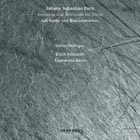 I’ve
lumped these two recordings together because they both contain
instrumental music from the Cantatas, though the ECM
includes only three such items and concentrates on music with
a prominent oboe part, well performed by the now veteran and
always thoroughly reliable Heinz Holliger. I’ve said three
because the so-called Easter Oratorio is actually a cantata.
I enjoyed this rather more than the Decca, though both are thoroughly
recommendable.
I’ve
lumped these two recordings together because they both contain
instrumental music from the Cantatas, though the ECM
includes only three such items and concentrates on music with
a prominent oboe part, well performed by the now veteran and
always thoroughly reliable Heinz Holliger. I’ve said three
because the so-called Easter Oratorio is actually a cantata.
I enjoyed this rather more than the Decca, though both are thoroughly
recommendable.
The emusic.com recording can’t begin to match the 24-bit
Linn download of the Decca – most tracks are at only around
220 kb/s – but it sounds better than the figures might
suggest and it can be yours for just £6.30 or less as
opposed to £7.99 from amazon.co.uk for a version likely
to be at most at 256 kb/s. Though hmvdigital.com offer some
downloads in 320 kb/s format, their version of this comes at
just 192 kb/s, again at £7.99, so the emusic.com is your
best bet.
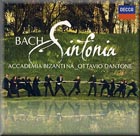 The
idea of taking the opening sinfonias from Bach’s cantatas
and weaving them together into an orchestral concert is less
unusual than it may appear since Bach himself was a frequent
borrower and adapter of his own works. The result on Decca
is extremely enjoyable, the performances stylish and mostly
brisk but by no means too brisk. It restored my faith in Dantone
and the Accademia Bizantina after being impressed with their
Vivaldi (Arts 47564 and 46565 – see review)
but slightly less so with their recording of Bach Keyboard Concertos
(Decca 475 9355 – see review).
The
idea of taking the opening sinfonias from Bach’s cantatas
and weaving them together into an orchestral concert is less
unusual than it may appear since Bach himself was a frequent
borrower and adapter of his own works. The result on Decca
is extremely enjoyable, the performances stylish and mostly
brisk but by no means too brisk. It restored my faith in Dantone
and the Accademia Bizantina after being impressed with their
Vivaldi (Arts 47564 and 46565 – see review)
but slightly less so with their recording of Bach Keyboard Concertos
(Decca 475 9355 – see review).
I’ve already commented on a number of Decca reissues from
Linn in the previous Download Roundup and I include their download
of Britten’s Peter Grimes below. Those are all taken
from 24/96 re-masters of earlier recordings but this Bach recording
is the first to have been originally recorded in that form,
so it benefits especially from having been made available as
a Linn Studio Master download.
Hardly surprisingly, it sounds first-class and, at £18,
comes at what seems to be becoming the going rate for 24/96.
If you’re happy with CD-quality 16/44.1 (£10) or
even mp3 (£8) these formats undercut the price of the
CD. I’m not sure how we came to designate this a budget
recording; I haven’t found anyone offering it much below
£12.
Johann Sebastian BACH Brandenburg
Concertos 1-6
New York Sinfonietta/Max Goberman – rec. 1960. ADD/stereo
BEULAH 12PD42 [105:47] – from iTunes
(mp3)
 Though
I’d already heard the Beulah Extra releases of Nos. 1 and
3 and Nos. 2 and 4 I’m still amazed that such stylish performances
had passed me by. At a time when my friends and I thought ourselves
the cat’s whiskers for listening to performances of the
Brandenburgs and Vivaldi’s Four Seasons from
Karl Münchinger and the Stuttgart Chamber Orchestra –
now sounding worthy but very dated – Max Gobermann and
the NY Sinfonietta were recording versions which still sound
well alongside more recent period-instrument accounts. The recording
has held up well, too – if you don’t like the harpsichord
to sound too prominent, you’ll have to accept that that
was the way that recordings of Bach were balanced them.
Though
I’d already heard the Beulah Extra releases of Nos. 1 and
3 and Nos. 2 and 4 I’m still amazed that such stylish performances
had passed me by. At a time when my friends and I thought ourselves
the cat’s whiskers for listening to performances of the
Brandenburgs and Vivaldi’s Four Seasons from
Karl Münchinger and the Stuttgart Chamber Orchestra –
now sounding worthy but very dated – Max Gobermann and
the NY Sinfonietta were recording versions which still sound
well alongside more recent period-instrument accounts. The recording
has held up well, too – if you don’t like the harpsichord
to sound too prominent, you’ll have to accept that that
was the way that recordings of Bach were balanced them.
I flagged this release briefly as a postscript to my previous
Roundup – unfortunately I had been given the wrong catalogue
number. All six concertos are available for £7.99; I haven’t
done the maths, but that seems to make them better value than
downloading individually from Beulah, albeit at 256kb/s rather
than the 320kb/s from Beulah. The Beulah option remains open:
No.1 7-10BX112 – see February 2012/1 Roundup
No.2 11-13BX112 – see February 2012/2 Roundup
No.3 6BX112 – see February 2012/1 Roundup
No.4 14-16BX112 – see February 2012/2 Roundup
No.5 (with alternative first movement) 17-20BX112 –
http://eavb.co.uk/apr/
No.6 21-23BX112 – http://eavb.co.uk/apr/
Johann Sebastian BACH Cello
Suites
CD 1
Suite No. 1 in G, BWV1007 [18:35]
Suite No. 2 in d minor, BWV1008 [20:35]
Suite No. 3 in C, BWV1009 [22:43]
CD 2
Suite No. 4 in E-flat, BWV1010 [23:24]
Suite No. 5 in c minor, BWV1011 [25:23]
Suite No. 6 in D, BWV1012 (for 5 string cello) [27:06]
Richard Tunnicliffe (cello c.1720 and 5-string cello piccolo,
c.1726) – rec. October 2010, February and November 2011.
DDD/DSD
Pitch: A=415kHz
Pdf booklet included.
LINN CKD396 [61:56 + 75:56] – from linnrecords.com
mp3, 16- and 24-bit lossless)
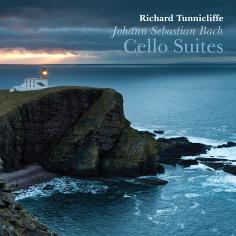 Having
greatly enjoyed Richard Tunnicliffe’s voyages of discovery
with the Avison Ensemble for the Divine Art label, I was looking
forward to hearing him in this more familiar repertoire for
Linn. For all the small reservations which I’m about to
express, let me say at once that this new recording is a fine
addition to the list of distinguished recordings of these Cello
Suites.
Having
greatly enjoyed Richard Tunnicliffe’s voyages of discovery
with the Avison Ensemble for the Divine Art label, I was looking
forward to hearing him in this more familiar repertoire for
Linn. For all the small reservations which I’m about to
express, let me say at once that this new recording is a fine
addition to the list of distinguished recordings of these Cello
Suites.
Any recording of the Bach Cello Suites has a number of formidable
obstacles to overcome. First and foremost the music must retain
its cerebral and academic appeal yet at the same time retain
the character of the dances which it incorporates and appeal
to the emotions – a problem which these suites share with
the Goldberg Variations and the Well-tempered Klavier.
Then the performances must compete with a number of highly recommendable
predecessors, both recent and historical, from Pablo Casals,
via Paul Tortelier (EMI Classics for Pleasure) and Pierre Fournier
(DG) to Stephen Isserlis (Hyperion CDA30001/2 –
see October 2010 Roundup).
The Isserlis has become my benchmark recording and it comes
at mid price on CD, though the downloads are charged at the
regular £15.49 for the two CDs, mp3 or lossless. Linn
have trumped Hyperion price-wise by offering all versions, from
mp3 (£8.00) to 24-bit (£18.00) and hybrid SACD (£15.00
– slightly less from some dealers) as 2-for-1. Whereas
Isserlis reports having toyed with using a 5-string cello for
Suite No.6 but eventually opted to play it on the conventional
4-string instrument, Tunnicliffe uses a 5-string instrument
of the kind apparently required for one of Bach’s cantatas.
Both the instruments employed date from the 1720s, the period
in which the suites are believed to have been written.
Three clear advantages, then, in terms of the instruments employed,
the availability of 24-bit downloads as well as mp3 and 16-bit,
and the asking price. Tunnicliffe’s tempi throughout Suite
No.1 are slower than those of Isserlis though not by so much
as to make the differences blatant. Tunnicliffe’s slightly
slower time benefits the sarabande (track 4), by definition
a stately dance, but there’s no lack of stateliness in
Isserlis’ performance and the minuets (track 5) and the
final gigue (tr.6) benefit from his slightly faster,
more rhythmic and ultimately more imaginative approach –
the difference is only really noticeable, however, playing one
after the other, which you are hardly likely to want to do normally.
I enjoyed Tunnicliffe’s performance in its own right and
that enjoyment is not erased by my liking Isserlis just that
little more.
There’s a more extreme difference of opinion in the case
of the allemande of Suite No.2 (tr.8) where Tunnicliffe
takes half as long again as Isserlis (3:47 against 2:33). Casals
and Tortelier also take this movement at roughly the same speed
as Tunnicliffe, while Fournier is a little faster but still
closer to the consensus. Only Rostropovich (EMI and Supraphon)
of the versions which I checked comes close to agreeing with
Isserlis. Surely the consensus must be right? Perhaps, but I
can’t help feeling that Isserlis’s approach is more
imaginative again, retaining the stateliness associated with
the allemande yet bringing the music to life for the
modern listener. No-one is likely to want to sit through all
six of these suites in one sitting but if anyone can tempt you
to do so it’s Isserlis.
It’s in Suite No.6 that Tunnicliffe scores with his use
of the 5-string instrument, for the very reason which Isserlis
gives for having tried and rejected it, its comparative lightness
of tone. His tempi here, too, are fresher, more dancing; he’s
actually faster in some movements than Isserlis. I haven’t
enjoyed the gavottes (tr.35) so much since Segovia’s classic
guitar transcription and the final gigue (tr.36) rounds
off the recording in fine style.
Isserlis includes some bonuses to fill out two slightly short
CDs – Sally Beamish’s arrangement of the traditional
Song of the Birds and some alternative movements from
Suite No.1 – but Linn’s 2-for-1 price trumps that.
Both recordings are excellent – I listened to the Linn
16-bit version, equivalent to Hyperion’s lossless version
– and both come with first-rate booklets of notes. Overall,
then, it’s a case of swings and roundabouts. I marginally
prefer Hyperion’s swings to Linn’s roundabouts but
it’s close and I shall continue to listen with great enjoyment
to both these recordings.
Johann Sebastian BACH
Keyboard Concerto No. 1 in d minor, BWV1052 (arranged Xue Fei
Yang for guitar and string quartet) [23:24]
Prelude and Fugue Book 1/1 in C, BWV846: Prelude (transcribed
to A major and arranged for solo guitar) [2:23]
Violin Concerto No. 2 in E, BWV1042 (arranged for guitar and
string quartet) [17:38]
Sonata for solo violin No. 1 in g minor, BWV1001 (arranged for
solo guitar) [15:06]
Violin Concerto No. 1 in a minor, BWV1041 (arranged for guitar
and string quartet) [13:37]
Orchestral Suite No. 3 in D, BWV1068: Air (‘Air on a G
String’) (arranged for solo guitar) [4:03]
Anna Magdalena Notenbuch (Clavier-Büchlein III):
Bist du bei mir, BWV 508 (arr. Xue Fei Yang for guitar)
[3:29]
Xue Fei Yang (guitar) with the Elias String Quartet – rec.?
EMI CLASSICS 5099909205758 [77:15] – from classicsonline.com
(mp3) or stream from Naxos Music Library
 There’s
an honourable and successful tradition of arranging Bach’s
music for the guitar – Segovia, Julian Bream and John Williams
– but these are Xue Fei Yang’s own arrangements and
they include two violin concertos and one for the keyboard,
so they’re more substantial than most of what those distinguished
predecessors have offered. This is not for purists, though they
should recall that several of Bach’s concertos exist as
arrangements of his own and others’ works; above all it
is fun and I enjoyed hearing it very much.
There’s
an honourable and successful tradition of arranging Bach’s
music for the guitar – Segovia, Julian Bream and John Williams
– but these are Xue Fei Yang’s own arrangements and
they include two violin concertos and one for the keyboard,
so they’re more substantial than most of what those distinguished
predecessors have offered. This is not for purists, though they
should recall that several of Bach’s concertos exist as
arrangements of his own and others’ works; above all it
is fun and I enjoyed hearing it very much.
My listening was restricted to the limited bit-rate of the Naxos
Music Library near-CD version, but that was good enough to encourage
me to think that the 320kb/s version from classicsonline.com
will be thoroughly recommendable sound-wise. Amazon.co.uk offer
the booklet and charge slightly less but their downloads come
at 256kb/s only.
Johann Sebastian BACH (1685-1750)
St John Passion
Fritz Wunderlich, Elisabeth Grümmer, Josef Traxel, Dietrich
Fischer-Dieskau, Lisa Otto, Karl Christian Kohn, Choir of St
Hedwig’s Cathedral Berlin
Berlin Symphony Orchestra/Karl Forster – rec. c.1961. ADD.
PAST CLASSICS [39:33 + 78:08] – from emusic.com
(mp3)
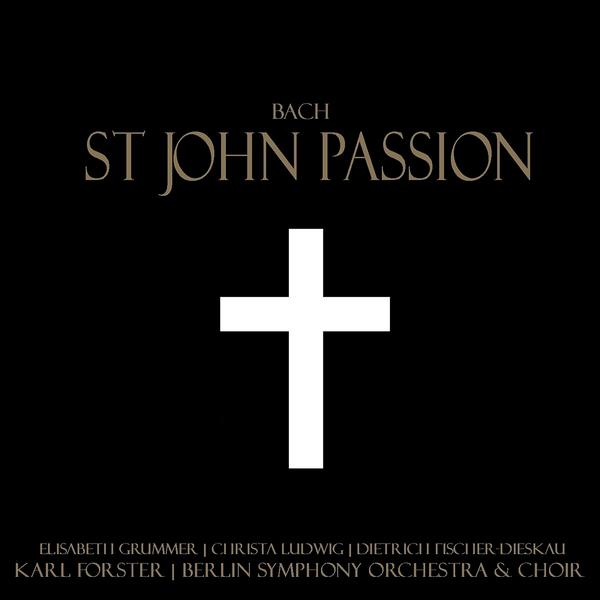 In
the previous Roundup I recommended Channel Classics’ recent
recording of the St John Passion directed by Jos van
Veldhoven. There will be those who hark back to an older age
of Bach recordings and this 1962 Electrola/EMI St John will
appeal to them, also, I think, to a wider audience. The cast
is a roll-call of the great and good of the time and the performance
is far from the dreary dragged-out affair that all too often
prevailed even in 1962. At £0.84 or less, it’s a
marvellous bargain and I was very pleased to make its acquaintance
again – it hasn’t been generally available in the
UK for a long time.
In
the previous Roundup I recommended Channel Classics’ recent
recording of the St John Passion directed by Jos van
Veldhoven. There will be those who hark back to an older age
of Bach recordings and this 1962 Electrola/EMI St John will
appeal to them, also, I think, to a wider audience. The cast
is a roll-call of the great and good of the time and the performance
is far from the dreary dragged-out affair that all too often
prevailed even in 1962. At £0.84 or less, it’s a
marvellous bargain and I was very pleased to make its acquaintance
again – it hasn’t been generally available in the
UK for a long time.
The bit-rate of the transfer is very low at 152kb/s but the
sound is adequate, if rather thin and with little (or no, I
think) stereo placement. There’s just the odd very light
clunk – more apparent on some systems than others –
to remind us that the transfer was made from LPs. Were it for
these, I would have made this Bargain of the Month. Amazon.co.uk
have the Past Classics version for £1.38 and an Electrola/EMI
download of the same performance for £7.49.
Georg GEBEL the Younger (1709-1753)
St John Passion (Der leidende, sterbende und begrabene Jesus)
Ika Kruse (Ancilla), Dorothee Mields (arias) (soprano); Thomas
Riede (Petrus), Henning Voss (arias) (alto); Mirko Heimerl (Servus),
Jan Kobow (Evangelist and arias) (tenor); Sebastian Bluth (Jesus),
Friedemann Klos (Pilatus), Klaus Mertens (arias) (bass)
Ensemble in Canto Weimar (Tilo Krause), Weimarer Barock-Ensemble/Ludger
Rémy – rec. 2002. DDD
CPO 999 894-2 [41:23+61:25] – from classicsonline.com
(mp3) or stream from Naxos Music Library
[Recording of the Month – see review
by Johan van Veen.]
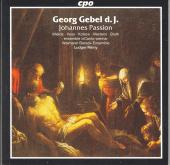
Without repeating the information which you can find in Johan
van Veen’s detailed review of the CDs, let me simply say
that if you’re looking for a Passion setting in the Bach
mould but where the recits go with more of a swing, this is
a wonderful discovery – even finer than the Gebel Christmas
music which I featured last December. The download, at £9.98,
represents quite a saving on the CDs which cost around £24
in the UK. There are no texts, but Luther’s translation
of St John is readily available online.
Gottfried August HOMILIUS (1714-1785)
St. Matthew Passion
Ann Monoyios (soprano)
Ulla Groenewold (contralto)
Gerd Tark, Christoph Prégardien (tenor)
Klaus Mertens, Hans-Georg Wimmer (bass)
Cappella Vocale Leverkusen/Christoph Schoener
Akadamie für Alte Musik Berlin/Bernhard Forck – rec:
January 1992. DDD.
Texts not included.
BERLIN CLASSICS 0010462 BC [74:26 + 56:44] – from
classicsonline.com
(mp3) or stream from Naxos Music Library
[‘The extraordinary performances by all the soloists and
the excellent recording and performance by the Akadamie für
Alte Musik Berlin all make this a must-have recording.’
– see review
by Kirk McElhearn]
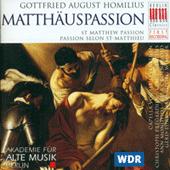 Berlin
Classics bill this as a first recording and, to the best of
my knowledge, this is still the only version of this work by
a composer of whose music there is all too little available
– some online dealers don’t even stock the parent
CD of this download: Amazon US have it, but not Amazon UK. The
music may not match either of the extant passions of JS Bach,
whose student Homilius was, or Telemann, but it certainly does
not deserve the neglect from which it has suffered, especially
as the performance does the music justice. In contrast with
many Berlin Classics recordings of music of this period, this
is historically aware, but that doesn’t mean that the performers
don’t engage with the music. The download price represents
a considerable saving over the cost of the CDs but comes without
notes, texts or translations.
Berlin
Classics bill this as a first recording and, to the best of
my knowledge, this is still the only version of this work by
a composer of whose music there is all too little available
– some online dealers don’t even stock the parent
CD of this download: Amazon US have it, but not Amazon UK. The
music may not match either of the extant passions of JS Bach,
whose student Homilius was, or Telemann, but it certainly does
not deserve the neglect from which it has suffered, especially
as the performance does the music justice. In contrast with
many Berlin Classics recordings of music of this period, this
is historically aware, but that doesn’t mean that the performers
don’t engage with the music. The download price represents
a considerable saving over the cost of the CDs but comes without
notes, texts or translations.
Don’t confuse the St Matthew Passion with another
work by Homilius, a passion cantata which begins with the same
words as the opening chorus – Ein Lämmlein geht
and trägt die Schuld (Carus 83.262).
Readers with good memories will recall that I mentioned this
recording last year in the April 2011/1 Roundup
on the basis of the lossless download from passionato.com. That
would still be preferable, but it’s no longer available
and the 320kb/s mp3 version from classicsonline.com makes a
completely satisfactory replacement.
Joseph HAYDN (1732-1809)
Symphony No.48 in C (Maria Theresa) (1769) [29:50]
Symphony No.49 in f minor (la Passione) (1768) [26:21]
Symphony No.50 in C (1773) [20:36]
Hanover Band/Roy Goodman – rec.1990 and 1992. DDD
pdf booklet included
HYPERION HELIOS CDH55119 [76:48] – from hyperion-records.co.uk
(mp3 and lossless)
 Symphony
No.49 is a strange work even among Haydn’s unusual middle-period
Sturm und Drang symphonies; it’s in f minor, a remote
key for the time, and it’s a particularly intense work,
as its nickname indicates. That intensity, combined with its
old-fashioned form, derived from the sonata da chiesa,
or church sonata, suggests that it was intended for performance
in Holy Week, perhaps on Good Friday itself, which is why I’m
including it in this roundup. I might equally well have included
the recording for the sake of the very attractive Maria Theresa
symphony, written to welcome the Empress to Esterháza.
Why do writers of CD notes in English persist in calling her
Maria Theresia? It’s Theresia in German but Theresa in
English.
Symphony
No.49 is a strange work even among Haydn’s unusual middle-period
Sturm und Drang symphonies; it’s in f minor, a remote
key for the time, and it’s a particularly intense work,
as its nickname indicates. That intensity, combined with its
old-fashioned form, derived from the sonata da chiesa,
or church sonata, suggests that it was intended for performance
in Holy Week, perhaps on Good Friday itself, which is why I’m
including it in this roundup. I might equally well have included
the recording for the sake of the very attractive Maria Theresa
symphony, written to welcome the Empress to Esterháza.
Why do writers of CD notes in English persist in calling her
Maria Theresia? It’s Theresia in German but Theresa in
English.
All three works here receive attractive performances, serving
as another reminder what a shame it was that this period-instrument
series of the Haydn symphonies was never completed. The recording
is excellent and the notes informative.
For recordings of some of the other Sturm und Drang symphonies,
Nos. 44-47, see the June 2009 and July 2009 Roundups. There’s
a good recording of another Haydn symphony probably composed
for Holy Week, No. 26, known as Lamentatione, from la
Petite Bande and Sigiswald Kuijken on a budget Virgin double
– download in 320kb/s mp3 for £6.99 from hmvdigital.com,
for £5.49 in 256kb/s format from amazon.co.uk,
or stream from Naxos Music Library but don’t follow the
purchase button to classicsonline.com, where it costs an unfeasible
£13.98, when the CD set costs around £8.50 in the
UK.
Johann Gottlieb NAUMANN (1741-1801)
La Passione di Gesù Cristo (1767) [120:04]
Monica Bragadin (mezzo); Makoto Sakurada (tenor); Raffaele Giordani
(tenor); Alfredo Grandini (bass)
Coro La Stagione Armonica
Orchestra di Padova e del Veneto/Sergio Balestracci – rec.
live, November 2006. DDD
CPO 777 365-2 [65:02 + 55:04] – download from classicsonline.com
(mp3) or stream from Naxos Music Library.
 [‘If
you enjoy late Baroque sacred choral music and want to explore
a less well-known corner, Naumann’s La Passione di Gesù
Cristo is well worth investigating.’ See review
by Mark Sealey.]
[‘If
you enjoy late Baroque sacred choral music and want to explore
a less well-known corner, Naumann’s La Passione di Gesù
Cristo is well worth investigating.’ See review
by Mark Sealey.]
The download is especially good value at £9.98 for two
CDs when the discs typically cost over £25, but the lack
of texts is a serious handicap, even with some guidance from
Mark Sealey’s review. You’ll find Metastasio’s
libretto, also set by Salieri and Paisiello, on the web but
from sources which may be of doubtful legality.
Giuseppe GIORDANI (1751-1798)
Passio per il Venerdi Santo (Passion for Good Friday,
1756)
Anke Herrmann (soprano); Carlo Lepore (bass); Maria José
Trullu (alto)
Ensemble Vocale di Napoli
Academia Montis Regalis/Alessandro De Marchi, Alessandro –
rec. c.1998? DDD.
OPUS111 OPS 30249/50 [1:31:44] – from classicsonline.com
(mp3) or stream from Naxos Music Library
 This
is another late-baroque Passion setting which is well worth
exploring. The recording seems not to be generally available
on CD in the UK or USA, so the download is especially welcome.
There’s no libretto and I couldn’t discover much about
the composer or the work – no entry in the Oxford Companion
to Music – but the Latin text of St John’s Gospel
is available online.
This
is another late-baroque Passion setting which is well worth
exploring. The recording seems not to be generally available
on CD in the UK or USA, so the download is especially welcome.
There’s no libretto and I couldn’t discover much about
the composer or the work – no entry in the Oxford Companion
to Music – but the Latin text of St John’s Gospel
is available online.
Johannes BRAHMS (1833-1897)
Symphony No.3 in F, Op.90 [36:00]
Edward ELGAR (1857-1934)
Symphony No.1 in A flat, Op.55 [45:06]
BBC Symphony Orchestra/Sir Adrian Boult – rec. live Proms
1977 (Brahms) and 1976 (Elgar). ADD/Stereo
Pdf booklet included
ICA CLASSICS ICAC5063 [81:15] – from classicsonline.com
(mp3) or stream from Naxos Music Library
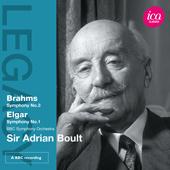 Though
comparative newcomers, ICA Classics are already building up
an enviable repertoire. I enjoyed their earlier release of Brahms’
First Symphony and Elgar’s Enigma Variations (ICAC5019
– see June 2011/1 Roundup
and review
by John Quinn) and was looking forward to this sequel. At first
I thought that I was about to be disappointed by the easy-going
opening of the first movement of the Brahms – indeed, by
the tempo pretty well throughout that movement. This is a gemütlich
Brahms, far removed from the craggy Brahms of Klemperer, whose
recordings of the Third and Fourth are still my benchmarks for
those works; Boult makes him sound more like the affable coffee
drinker of the drawing by Batt which was included in the original
Oxford Companion to Music.
Though
comparative newcomers, ICA Classics are already building up
an enviable repertoire. I enjoyed their earlier release of Brahms’
First Symphony and Elgar’s Enigma Variations (ICAC5019
– see June 2011/1 Roundup
and review
by John Quinn) and was looking forward to this sequel. At first
I thought that I was about to be disappointed by the easy-going
opening of the first movement of the Brahms – indeed, by
the tempo pretty well throughout that movement. This is a gemütlich
Brahms, far removed from the craggy Brahms of Klemperer, whose
recordings of the Third and Fourth are still my benchmarks for
those works; Boult makes him sound more like the affable coffee
drinker of the drawing by Batt which was included in the original
Oxford Companion to Music.
I still hanker after Klemperer’s Brahms but this smoother
Boult recording will be more to some people’s tastes especially
as there was a traceable line of tradition from composer to
conductor – something even more true, of course, of Elgar
and Boult. Though he recorded the Elgar First many times, this
performance has a vitality which I find lacking in his Lyrita
recording made the same year. The urgency which I missed in
the first movement of his Brahms is there in abundance in the
first movement of the Elgar.
The BBC live recordings are not ideal but they are good enough
to convey the sense of occasion in both cases. The audience
is pretty unobtrusive, especially by Prom Concert standards.
Jean SIBELIUS (1865-1957)
Symphony No. 6 in d minor op. 104 [27:33]
Symphony No. 4 in a minor op. 63 [33:04]
Royal Philharmonic Orchestra (6); BBC Symphony Orchestra (4)/Sir
Thomas Beecham
rec. live, Royal Albert Hall, Prom, 15 Sept 1954 (6); Studio,
Criterion Theatre, London, 4 Oct 1951 (4). mono. ADD
SOMM SOMM-BEECHAM 18 [61:23] – from theclassicalshop.net
(mp3 and lossless)
[See reviews by Rob Barnett – here
– Christopher Howell – here
– and Jonathan Woolf – here.]
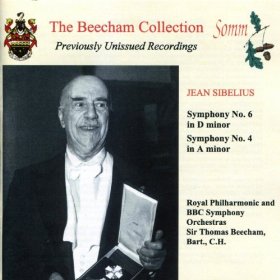 Beecham’s
Sibelius was always very special, as, indeed, it is here, but
I’m afraid that for me that’s not quite enough to
overcome the shortcomings of the recordings. There’s a
better-sounding version, though still in rather muffled mono
and with a bronchitic audience, of the Fourth on BBC Legends,
coupled with the Seventh and excerpts from Swanwhite,
Pelleas and Melisande and The Tempest (BBCL4041-2,
2 CDs, from classicsonline.com
or stream from Naxos Music Library.) For the BBC recording see
joint review by Rob Barnett (****) and Gerald Fenech (*****)
– here.
Beecham’s
Sibelius was always very special, as, indeed, it is here, but
I’m afraid that for me that’s not quite enough to
overcome the shortcomings of the recordings. There’s a
better-sounding version, though still in rather muffled mono
and with a bronchitic audience, of the Fourth on BBC Legends,
coupled with the Seventh and excerpts from Swanwhite,
Pelleas and Melisande and The Tempest (BBCL4041-2,
2 CDs, from classicsonline.com
or stream from Naxos Music Library.) For the BBC recording see
joint review by Rob Barnett (****) and Gerald Fenech (*****)
– here.
Beecham’s 1930s recordings of the Fourth, En Saga,
Finlandia, etc. have been well restored by Naxos –
in some respects sounding better than the Somm release. (8.110867
– from classicsonline.com
or stream from Naxos Music Library). See review
by Rob Barnett.
Aaron COPLAND (1900-1990)
Rodeo – four dance episodes [19:25]
Piano Concerto (1926) [17:52]
Billy the Kid – suite [20:52]
Lorin Hollander (piano)
Seattle Symphony/Gerard Schwarz – rec. 1990 and 1993. DDD.
Pdf booklet included
NAXOS 8.571202 [58:09] – from classicsonline.com
(mp3) or stream from Naxos Music Library
 The
latest instalment in Naxos’s series of reissues of Gerard
Schwarz’s recordings of American Music with the Seattle
Symphony is self-recommending. Two of Copland’s best known
scores are combined with the more serious, though far from unapproachable
Piano Concerto – no longer likely to be thought a ‘harrowing
horror’ as it originally was. Performances and recording
are exemplary. Now we need the recording of Appalachian Spring
with which the concerto was originally coupled. Meanwhile my
recommendation for that work (the complete ballet) remains Michael
Tilson Thomas (RCA); at £3.49 from amazon.co.uk, it’s
even cheaper to download than when I recommended it (with Rodeo
and Billy the Kid, October 2009 Roundup).
That’s at 256kb/s; hmvdigital.com have it in 320kb/s mp3
for a little more (£4.74).
The
latest instalment in Naxos’s series of reissues of Gerard
Schwarz’s recordings of American Music with the Seattle
Symphony is self-recommending. Two of Copland’s best known
scores are combined with the more serious, though far from unapproachable
Piano Concerto – no longer likely to be thought a ‘harrowing
horror’ as it originally was. Performances and recording
are exemplary. Now we need the recording of Appalachian Spring
with which the concerto was originally coupled. Meanwhile my
recommendation for that work (the complete ballet) remains Michael
Tilson Thomas (RCA); at £3.49 from amazon.co.uk, it’s
even cheaper to download than when I recommended it (with Rodeo
and Billy the Kid, October 2009 Roundup).
That’s at 256kb/s; hmvdigital.com have it in 320kb/s mp3
for a little more (£4.74).
For a real bargain emusic.com have Copland’s own recording
of the Appalachian Spring Suite and The Tender Land
suite for just £1.26 – here.
I’ve sampled this and thought the sound a little thin,
but acceptable.
Classicsonline.com also have the original Delos recording, again
at £4.99, on which the music from Billy the Kid
was coupled with just two of the episodes from Rodeo,
Outdoor Overture, On the trail from Grofe’s Grand
Canyon Suite and excerpts from Hanson’s Third Symphony
and Hovhaness’s Mount St Helens Symphony. (DE1603).
Dmitri SHOSTAKOVICH (1906-1975)
Symphony No.10 in E minor, Op.93º [50.41]
Pyotr Ilyich TCHAIKOVSKY (1840-1893)
Snow Maiden Suite – Melodramaº [2.56]
Nikolai RIMSKY-KORSAKOV (1844-1908)
The Legend of the Invisible City of Kitezh*
Hymn to Nature; The Battle of Kerzhenets [8.24]
USSR State Symphony Orchestra/Evgeny Svetlanov
rec. Royal Albert Hall, London, 21 August 1968 (Shostakovich),
22 August 1968 (Tchaikovsky) and 30 August 1968 (Rimsky-Korsakov)
ADD
ICA Ambient Masteringº; Stereo*
ICA CLASSICS ICAC5036 [62:17] – from classicsonline.com
(mp3) or stream from Naxos Music Library
[Sample on YouTube – here.]
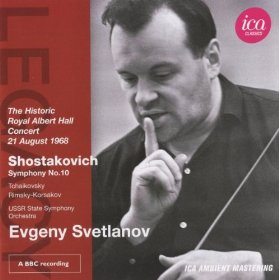 This
is the (in)famous Proms recording from August 1968 immediately
after the Russian tanks rolled into Prague – hence the
cacophony of protest at the opening which ICA have let stand,
though it partially obliterates the beginning of the symphony.
If you don’t mind that and the dated BBC recording, the
performance starts slowly and builds up to incandescence –
it has aptly been described as the performance of Svetlanov’s
lifetime. ICA have done their best with the sound – it’s
certainly more than acceptable – and the booklet explains
what occurred on the night. Not a prime recommendation but well
worth having. The fillers are attractive but insubstantial by
comparison with the main course; they do at least add to the
playing time when the Tenth is usually left alone on a short
CD.
This
is the (in)famous Proms recording from August 1968 immediately
after the Russian tanks rolled into Prague – hence the
cacophony of protest at the opening which ICA have let stand,
though it partially obliterates the beginning of the symphony.
If you don’t mind that and the dated BBC recording, the
performance starts slowly and builds up to incandescence –
it has aptly been described as the performance of Svetlanov’s
lifetime. ICA have done their best with the sound – it’s
certainly more than acceptable – and the booklet explains
what occurred on the night. Not a prime recommendation but well
worth having. The fillers are attractive but insubstantial by
comparison with the main course; they do at least add to the
playing time when the Tenth is usually left alone on a short
CD.
Benjamin BRITTEN (1913-1976)
Peter Grimes
Peter Pears (Grimes), Claire Watson (Ellen Orford), James Pease
(Balstrode), Jean Watson (Auntie), Geraint Evans (Ned Keene),
Lauris Elms (Mrs Sedley), David Kelly (Hobson), Owen Brannigan
(Swallow), Raymond Nilsson (Bob Boles), Marion Studholme, Iris
Kells (Nieces)
Orchestra and Chorus of the Royal Opera House, Covent Garden/Benjamin
Britten – rec. December 1958
DECCA ORIGINALS 475 7713 [2:22:17] – from linnrecords.com
(UNI012 – mp3, 16- and 24-bit lossless)
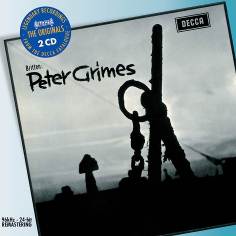 For
all the qualities of the Colin Davis version (formerly Philips,
now Decca Opera) the Pears-Britten version from 1958 is the
one to have, still sounding excellent in this re-mastered version
to which Linn’s Studio Master download does full justice.
The quality of the recording in this format – transferred
directly from Decca’s 24/96 masters – is exceptional.
As for the performance, for all that I’m no great fan of
Peter Pears’ voice in any music other than Britten’s,
he simply is Peter Grimes as no other can be;
there isn’t a weak member of the cast and Benjamin Britten’s
direction is definitive. If I get bogged down with comments
on recording and price below, don’t lose sight of the fact
that it’s for the sake of the performance that I chiefly
recommend this download.
For
all the qualities of the Colin Davis version (formerly Philips,
now Decca Opera) the Pears-Britten version from 1958 is the
one to have, still sounding excellent in this re-mastered version
to which Linn’s Studio Master download does full justice.
The quality of the recording in this format – transferred
directly from Decca’s 24/96 masters – is exceptional.
As for the performance, for all that I’m no great fan of
Peter Pears’ voice in any music other than Britten’s,
he simply is Peter Grimes as no other can be;
there isn’t a weak member of the cast and Benjamin Britten’s
direction is definitive. If I get bogged down with comments
on recording and price below, don’t lose sight of the fact
that it’s for the sake of the performance that I chiefly
recommend this download.
I mentioned the passionato.com lossless version of this recording
in the October 2011/1 Roundup, fully intending to offer a complete
review at a later date but events overtook me and that link,
like all the links that I’ve given to passionato.com downloads,
no longer applies. That makes the Linn version the best show
in town if you want 16- or 24-bit lossless. Whether that makes
it worth paying £13 for the 16/44.1 version, when the
CDs can be had for around that price, or £23 for the Studio
Master 24/96 you must decide.
I believe that audiophiles will think the 24/96 well worth the
price. It’s not very helpful to Linn that deutschegrammophon.com,
having licensed this recording to them, undercut their prices
very slightly for mp3 and 16/44.1. No doubt their reason for
licensing the recording was to call upon Linn’s technological
reputation in offering a Studio Master version, a format which
DG themselves don’t provide.
If you’re just looking for mp3, at £10 the Linn download
is a little less expensive than the CDs. Emusic.com offer a
version of this recording for a ridiculously inexpensive £1.26
or less; I can’t vouch for the quality* – their downloads
often come at low bit-rates – but by offering each act
complete on one track they obviate the one small problem that
I found with the Linn download: surprisingly, using Winamp,
I occasionally noticed an infinitesimally slight dropout between
tracks where the music is continuous.
It’s hardly a major problem; it won’t spoil your enjoyment
and you have to be listening carefully to spot it, but it’s
surprising because lossless recordings don’t usually suffer
from the problem in Winamp. These infinitesimal dropouts don’t
occur if you play the music via Songbird – like Winamp
it’s free and simple to install and I now recommend its
use – but I suggest that, to be absolutely sure, you purchase
the flac version rather than the wma which I chose.
* the 30-second samples of each act really don’t sound
at all bad.
The Golden Age of Hollywood 2
Bernard HERRMANN (1911-1975)
Vertigo – Prelude; The Nightmare; Scene d’amour
[10:52]
North by Northwest – Overture [3:24]
Max STEINER (188-1971) The
Caine Mutiny – March [2:22]
Bernard HERRMANN Citizen
Kane Prelude and Finale [4:59]
Erich Wolfgang KORNGOLD (1897-1957)
The Adventures of Robin Hood – The Fight, Victory
and Epilogue [4:55]
Elmer BERNSTEIN (1922-2004)
To Kill A Mockingbird – Suite [8:04]
Miklós RÓZSA (1907-1995)
The Private Life of Sherlock Holmes – Violin
Concerto 2nd movement [10:41]
Franz WAXMAN (1906-1967)
Sunset Boulevard – Suite [7:57]
A Place in the Sun – Suite [8:31]
Dimitri TIOMKIN (1894-1979)
Dial M for Murder – Theme [4:34]
Nino ROTA (1911-1979) The
Godfather – Sicilian Pastorale; Michael and Kay; Love
Theme [7:19]
Clio Gould (violin)
Royal Philharmonic Orchestra/José Serebrier – rec?
(P) and © 2007.
Pdf booklet included.
ORCHID CLASSICS RPO022 [73:38] – from classicsonline.com
(mp3) or stream from Naxos Music Library
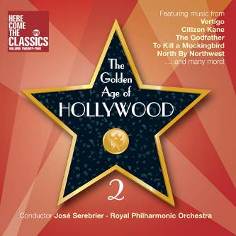 With
a ‘Here come the classics’ sticker on the cover, this
album and its predecessor are clearly designed for popular appeal,
but most of the music is worthy to stand alongside the classical
tradition. Most of the composers, of course, also wrote ‘serious’
music; in the case of Rozsa’s score for Sherlock Holmes
there’s even a direct borrowing from his Violin Concerto.
The recording of this work is deliberately heartfelt and drawn-out
by comparison with the classic Heifetz/Piatigorsky recording
(10:41 against 7:33) but that’s my only small reservation
about the performances and, in any case, some think Heifetz
a little too fast here.
With
a ‘Here come the classics’ sticker on the cover, this
album and its predecessor are clearly designed for popular appeal,
but most of the music is worthy to stand alongside the classical
tradition. Most of the composers, of course, also wrote ‘serious’
music; in the case of Rozsa’s score for Sherlock Holmes
there’s even a direct borrowing from his Violin Concerto.
The recording of this work is deliberately heartfelt and drawn-out
by comparison with the classic Heifetz/Piatigorsky recording
(10:41 against 7:33) but that’s my only small reservation
about the performances and, in any case, some think Heifetz
a little too fast here.
The recording is good, a detailed booklet comes with the deal
and the price is right – just £4.99. You may also
wish to investigate Volume 1 (RPO017).
The Heifetz, coupled with Korngold and Waxman, is a splendid
bargain as a download for £3.99 from amazon.co.uk.
UK listeners will find an even less expensive download of the
earlier mono recording of the Rozsa, coupled with Tchaikovsky
and Spohr, on Naxos Classical Archives 9.80201 – from classicsonline.com
for £1.99.
Volumes 1 and 2 reviewed here
by Rob Barnett: ‘They’re each a great way to survey
the Hollywood classic scores.’
The Maiden’s Prayer and other gems from an old piano
stool
Christian SINDING (1856-1941)
Pieces, Op. 32 – No. 3 Rustle of Spring (1896) [2:46]
Tekla BADARZEWSKA (1834-61)
The Maiden’s Prayer (1851) [4:14]
Antonín DVOŘÁK
(1841-1904)
Humoresques, B187 – No. 7, Humoresque in G flat (1894)
[2:56]
Selim PALMGREN (1878-1951)
Spring, Op. 57 – No. 4, May Night (1907) [2:44]
Moritz MOSZKOWSKI (1854-1925)
Pieces, Op. 15 – No. 1, Serenata (c1875) [1:56]
Anton RUBINSTEIN (1829-94)
Melody in F, Op. 3 No. 1 (1852) [3:23]
Ignacy Jan PADEREWSKI (1860-1941)
Humoresques de concert, Op. 14 – No. 1, Minuet in
G (1887/8) [4:00]
Domenico PARADIES (1707-1791)
Sonate di gravicembalo – Sonata No. 6, Toccata in
A (1754) [2:39]
George Frederic HANDEL (1685-1759)
Suite No. 5 in E, HWV430 – Air and Variations, ‘The
Harmonious Blacksmith’ (1720) [4:45]
Ludwig van BEETHOVEN (1770-1827)
Minuets, WoO10 – No. 2, Minuet in G (1795) [2:11]
Felix MENDELSSOHN (1809-1847)
Songs without Words, Book 5, Op. 62 – No. 6, Spring Song
(1844) [2:30]
Pyotr Ilyich TCHAIKOVSKY (1840-1893)
Morceaux, Op. 40 – No. 2, Chanson triste (1878)
[2:38]
Jean SIBELIUS (1865-1957)
Pieces, Op. 75 – No. 5, Kuusi (The Spruce Tree)
(1914) [2:40]
William MASON (1829-1908)
Silver Spring, Op. 6 (c1850) [4:52]
Albert PIECZONKA
Danses de salon – No. 1, Tarantella in A minor (date
unknown) [2:31]
Edvard GRIEG (1843-1907)
Lyric Pieces, Book 5, Op. 54 – No. 4, Nocturne (1891) [3:49]
Victor HERBERT (1859-1924)
La Coquette – Valse brillante (1900) [3:02]
Zdeněk
FIBICH (1850-1900)
Moods, Impressions and Reminiscences, Op. 41 – No. 14,
Poème (1892/3) [1:21]
Ede POLDINI (1869-1957)
Marionettes – No. 2, Poupée valsante (1895)
[3:15]
Edward MACDOWELL (1860-1908)
Woodland Sketches, Op. 51 – No. 1, To a wild rose (1896)
[1:53]
Joachim RAFF (1822-82)
Pieces, Op. 157 – No. 2, La Fileuse (1870) [4:02]
Ethelbert NEVIN (1862-1901)
Water Scenes, Op. 13 – No. 4, Narcissus (1891) [1:57]
Alfred GRÜNFELD (1852-1924)
Romanze, Op.45 No. 1 (c1914) [5:09]
Marie Auguste DURAND (1830-1909)
Première Valse (before 1870) [4:00]
Philip Martin (piano)
rec. 3 October 2002, All Saints’ Church, East Finchley,
London
Pdf booklet included
HYPERION HELIOS CDH 55410 [77:10] – from hyperion-records.co.uk
(mp3 and lossless)
 The
Dublin-born pianist Philip Martin first caught my ear with one
of his Hyperion discs of piano music by Louis Moreau Gottschalk.
It was a double discovery, because until then I’d not heard
a note of that composer’s extensive œuvre;
happily I was soon able to hear the rest of that cycle (CDS4451/8
– review)
increasing my admiration for both the composer and pianist in
the process.* Which is why I jumped at the chance to review
this lossless download of miniatures, first issued in 2003 as
CDA67379 and reviewed
by Colin Clarke. Apart from Martin’s intriguing selection
– a judicious mix of the familiar and the obscure –
I really looked forward to his highly communicative playing
style, a blend of discreet virtuosity and infectious charm.
The
Dublin-born pianist Philip Martin first caught my ear with one
of his Hyperion discs of piano music by Louis Moreau Gottschalk.
It was a double discovery, because until then I’d not heard
a note of that composer’s extensive œuvre;
happily I was soon able to hear the rest of that cycle (CDS4451/8
– review)
increasing my admiration for both the composer and pianist in
the process.* Which is why I jumped at the chance to review
this lossless download of miniatures, first issued in 2003 as
CDA67379 and reviewed
by Colin Clarke. Apart from Martin’s intriguing selection
– a judicious mix of the familiar and the obscure –
I really looked forward to his highly communicative playing
style, a blend of discreet virtuosity and infectious charm.
As expected, this is a most engaging recital, Christian Sinding’s
Rustle of Spring an effervescent entrée
to what follows. As for the title piece, The Maiden’s
Prayer by Tekla Badarzewska, it’s delivered with all
the delicacy and rhythmic felicities that characterise Martin’s
Gottschalk, while Selim Palmgren’s May Night is
simple yet enchanting. As ever, Hyperion’s natural piano
sound is thoroughly embraceable, offering warmth, detail and
an ideal balance. Also Martin’s touch control – as
anyone who’s heard Tremolo will attest – is
exemplary; the nimble Moszowski Serenata is an apt demonstration
of that.
What really appeals to me about this particular collection is
its salon-like intimacy, the listeners relaxed and the pianist
in affable, eye-twinkling mood. There’s a marvellous sense
of give and take here, the emphasis not so much on a formal
recital as it is on creating a pleasing ambience in which to
savour this enticing fare. One of the loveliest pieces is the
Paderewski Minuet in G, so sensitively shaped and scaled;
indeed, one could almost imagine a smattering of applause and
laughter at its close. And even when virtuosity is called for
– as in the focused late baroquerie of the Paradies and
Handel – it’s disarmingly done, articulation and dynamics
well judged.
Programming is all-important in compendiums such as this, if
the ear is not to tire or the mind wander. I can’t fault
Martin here either, as the artful sequence and variety of styles
keeps one entertained to the very end. If there are any weaknesses
I can’t find them; Beethoven’s trip-tripping Minuet
in G is carefree, the Tchaikovsky warmly expressive. As
if this weren’t evidence enough of Martin’s eclectic
range, just sample the coruscations of William Mason’s
Silver Spring. But, as always, this collection modulates
back to the key of ease, with a string of familiar, reassuring
tunes that will tempt you dim the lights and chill.
Of the less well known pieces, Victor Herbert’s coquettish
waltz and Ede Poldini’s Marionettes are pure delight
– Martin’s at his most playful here – the disc
rounding off with a sit-up-an-listen waltz by Marie-Auguste
Durand; a bracing sorbet with which to end this delectable meal.
The pdf liner-notes are up to the usual standards of the house
and the download process itself couldn’t be simpler.
An enchanted evening at the piano. Not to be missed.
Dan Morgan
http://twitter.com/mahlerei
* See also my joint review with Dan of Volume 5 of that series
– June 2011/1 Roundup.
If you like the Hyperion recordings of Gottschalk’s solo
piano music, your next port of call could well be his music
for piano solo and piano with orchestra, very inexpensively
available on the set which I mention there, CDX-5009,
or on a 2-CD Vanguard set (ATM-CD-1906: Eugene List;
Utah SO/Maurice Abravanel – download from classicsonline.com
(mp3) or stream from Naxos Music Library). [BW]
In brief
A listing here does not preclude a fuller review later.
Ludwig van BEETHOVEN (1770-1827)
Symphony No. 9 Choral
Amanda Roocroft (soprano), Fiona Janes (mezzo), John Mark Ainsley
(tenor), Neal Davies (bass) The New Company, Orchestra of The
Age of Enlightenment/Sir Charles Mackerras – rec. 1994.
DDD.
SIGNUM CLASSICS SIGCD 254 [63:50]
[Recording of the Month: An excellent account
of the Ninth, which forms an invaluable supplement to Sir Charles’s
superb cycle of the symphonies on Hyperion – see review
by John Quinn.]
Download from emusic.com
(mp3) for just £1.68 or wait for a version with a higher
bit-rate to appear from classicsonline.com.
François COUPERIN (1668-1733)
Exultent superi – Motets Choisis
Soloists of the Choir of New College Oxford
Collegium Novum/Edward Higginbottom – rec. 2011
NOVUM NCR 1384 [61:55] – from classicsonline.com.
(mp3)
[Recording of the Month: see review
by MC: ‘Quite stunning in all respects!’]
Italia
Antonio VIVALDI (1678 – 1741)
Violin concertos, Nulla in mundo pax sincera
Giuseppe TARTINI (1692 –
1770) Violin concerto, Violin sonata
Nicola Benedetti (violin) Scottish CO/Christian Curnyn –
rec. 2010
DECCA 476 4342 [76:54] – from hmvdigital.com
(mp3, 320kb/s).
[Recording of the Month – see review
by DC]
Gustav HOLST (1874-1934)
Cotswolds Symphony, Op.8 [27:09]
Walt Whitman Overture, Op.7 [07:27]
Suite No.2 in F (A Hampshire Suite), Op.28/2 [11:51]
Ballet Music from The Perfect Fool, Op.39 [12:00]
Scherzo for Orchestra [5:52]
Munich Symphony Orchestra/Douglas Bostock
Pdf booklet included
ClassicO CLASSCD 284 [65:04] – from classicsonline.com
(mp3) or stream from Naxos Music Library
[see four-star reviews by Richard
R Adams and Gerald
Fenech]
This ClassicO recording has recently been reissued on the Musical
Concepts budget Alto label (ALC1170), but it’s already
available for only £4.99 from classicsonline.com. The
download comes with the booklet of notes, though I think they
have been abridged since Gerald Fenech thought them ‘something
else’.




 All Nimbus reviews
All Nimbus reviews








